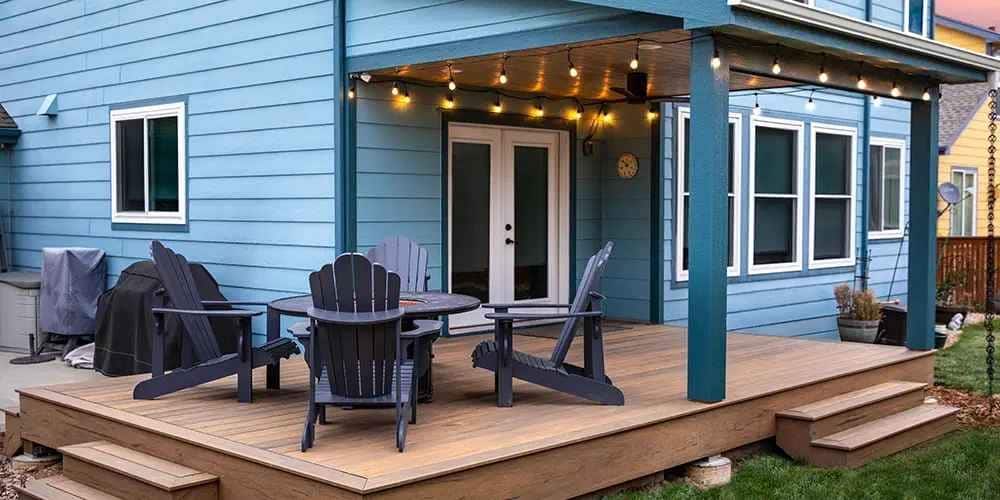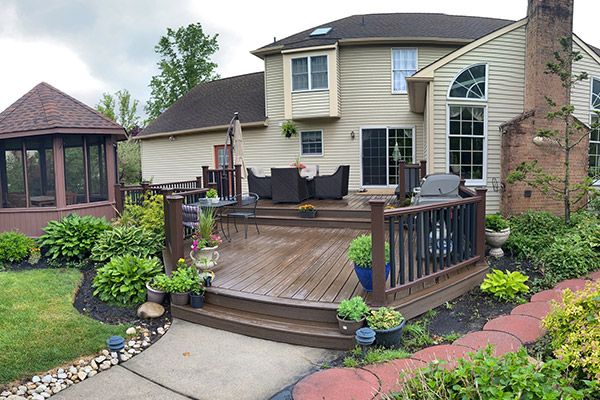Exploring Various Types and Advantages of Deck: A Comprehensive Overview
The outdoor deck is more than simply an expansion of one's living area; it's a testament to individual design, a location for social gatherings, and a refuge to unwind. The selection of decking product considerably affects these elements, with choices ranging from the traditional allure of wood to the practicality of composite, and the durability of light weight aluminum. Recognizing the nuances of these products is crucial, so let's start our expedition, one deck type at once.
Understanding the Essentials of Outdoor Decking Product
Decking material functions as the foundation of any type of deck task, dictating the overall visual appeals, durability, and functionality of the end product. The marketplace provides a vast series of materials, each with one-of-a-kind qualities suited to numerous layout choices and environmental conditions. The option includes natural wood, composite, plastic, aluminium, and even concrete. Timber, being the conventional option, offers a timeless, timeless allure. Compound, a mix of wood and plastic, provides wood-like looks with less maintenance. Plastic and aluminium provide modern, minimalistic options, while concrete is favored for its unrivaled resilience. The selection of product significantly affects the deck's life-span, upkeep demands, and resistance to components. Recognizing the basics of outdoor decking material is essential for a successful deck job.
Advantages and Disadvantages of Wood Decks
In assessing deck kinds, understanding the pros and cons of wood decks becomes vital. This entails taking into consideration aspects such as the sort of wood picked and its effect on the deck's efficiency. The succeeding discussion will certainly explore these points thoroughly to give a comprehensive view of the advantages and downsides connected with wood decks.

Wood Deck: Pros & Cons
The beauty of wood decks can not be overstated. They radiate a timeless appeal and warm visual that lots of property owners locate alluring. This natural product is functional, enabling a variety of layout opportunities, and can provide an excellent return on investment.
However, timber decks also come with certain disadvantages. They require constant upkeep, including normal cleaning, discoloration or painting, and possible substitute of warped or rotten boards. Timber is also prone to damage from pests and severe weather condition conditions. Its longevity can be less than various other outdoor decking products, specifically otherwise properly taken care of.
Selecting Your Wood Kind

Exploring the Advantages of Composite Decking
Turning attention to composite decking, it provides special benefits. Its sturdiness outmatches conventional timber in severe weather, minimizing the demand for constant upkeep. It provides a pleasing visual appeal with variable design options.
Compound Decking Durability Benefits
Despite the variety of outdoor decking choices offered in the market, composite outdoor decking stands out for its resilience. This kind of decking, made from a mix of timber and plastic, supplies a durable, resilient platform immune to components that generally deteriorate other materials. In recap, the resilience benefits of composite outdoor decking provide a lasting, cost-effective service for exterior living areas.
Maintenance of Compound Decks
In enhancement to sturdiness, composite outdoor decking flaunts a major benefit in terms of upkeep. Unlike traditional timber decks, composite decks are not at risk to rot, warp, or insect damages, hence considerably minimizing the need for routine repair work and substitutes. The low-maintenance nature of composite decks not just supplies simplicity of maintenance yet likewise adds to their long-lasting cost-effectiveness.
Aesthetic Charm and Irregularity

The Increasing Appeal of Aluminum Decks: Why Choose Them?
As the need for low-maintenance and resilient outdoor decking increases, light weight aluminum decks are significantly becoming the go-to choice for lots of home owners and builders. These decks, made from a light-weight yet sturdy metal, offer several advantages over conventional wood or composite decks. Aluminum decks are also environmentally friendly, as they are commonly made from recycled materials and can be recycled again at the end of their lifespan.
Maintenance Tips for Different Decking Products
In spite of the variety of decking products offered on the market, each features its very own set of upkeep demands to guarantee long life and visual appeal. For example, all-natural wood decks call for routine securing or tarnishing to avoid weather condition damage, while composite decks need regular cleansing with soap and water to eliminate spots and debris. On the various other hand, aluminum decks need less upkeep, only requiring periodic rinsing with water to keep them clean. Treated timber decks, although immune to rot and insects, likewise require regular securing to keep wetness out. For that reason, understanding these upkeep requires is important for deck proprietors to maximize their financial investment and keep their decks looking their best for many years ahead.
Factors to Think About When Selecting Your Deck Kind
What variables should one take into consideration when selecting the kind of deck to set up? The initial facet to analyze is the climate. Specific products are a lot more long lasting in certain weather. Composite decks resist moisture well, making them perfect for damp or wet regions. The property owner's way visit site of life need to likewise influence the decision. If they delight in exterior enjoyable, they may choose a sizable, sturdy hardwood deck. Expense is another significant factor. While some might prefer a lavish, exotic timber deck, budget plan restraints could require a more affordable option like pressure-treated timber. Last but not least, maintenance requirements need to be examined. Decks needing less maintenance, like vinyl, can be useful for busy house owners. Hence, environment, price, lifestyle, and upkeep are crucial considerations in deck choice.
Verdict
Timber decks bewitch with natural appeal, while composite and light weight aluminum ranges provide toughness and low maintenance. Before committing to a certain deck kind, property owners should thoroughly consider the advantages, downsides, and upkeep demands of each material.
In evaluating deck kinds, understanding the pros and disadvantages of wood decks becomes crucial.Regardless of the huge selection of decking alternatives readily available in the market, composite decking stands out for its longevity. Unlike standard wood decks, composite decks are not vulnerable to rot, warp, or insect damages, therefore drastically lowering the demand for regular fixings and replacements. These decks, made from a light-weight yet durable steel, supply a number of advantages over traditional wood or composite decks. Natural wood decks call for regular securing or staining to prevent weather condition damages, while composite decks need routine cleansing with soap and water to eliminate stains and debris.